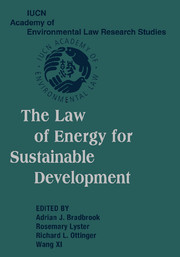Book contents
- Frontmatter
- Contents
- Acknowledgments
- Message from Kofi A. Annan, Secretary-General, United Nations
- Introduction – A Global Learned Society to Address Earth's Evolution: The IUCN Academy of Environmental Law
- Public Lectures on International Environmental Law
- PART ONE SUSTAINABLE DEVELOPMENT AND THE ROLE OF ENERGY LAW
- PART TWO LEGAL ISSUES IN CONTEMPORARY ENERGY LAW
- 7 Legal Frameworks for Energy for Sustainable Development
- 8 Air Pollution Control Laws: Common but Differentiated Responsibilities for Managing the Atmosphere
- 9 Green Pricing and Green Power Marketing: Demand-Side Mechanisms for Promoting “Green Power” in Deregulated Energy Markets
- 10 Agricultural Renewable Energy and Its Management in China
- PART THREE INTERNATIONAL ENERGY LAW
- PART FOUR COMPARATIVE ENERGY LAW
- PART FIVE ELECTRICITY RESTRUCTURING
- PART SIX FINANCING FOR SUSTAINABLE ENERGY
- PART SEVEN CIVIL SOCIETY AND THE PROCEDURAL REQUIREMENTS OF ENERGY LAW FOR SUSTAINABLE DEVELOPMENT
- Index
10 - Agricultural Renewable Energy and Its Management in China
Published online by Cambridge University Press: 10 August 2009
- Frontmatter
- Contents
- Acknowledgments
- Message from Kofi A. Annan, Secretary-General, United Nations
- Introduction – A Global Learned Society to Address Earth's Evolution: The IUCN Academy of Environmental Law
- Public Lectures on International Environmental Law
- PART ONE SUSTAINABLE DEVELOPMENT AND THE ROLE OF ENERGY LAW
- PART TWO LEGAL ISSUES IN CONTEMPORARY ENERGY LAW
- 7 Legal Frameworks for Energy for Sustainable Development
- 8 Air Pollution Control Laws: Common but Differentiated Responsibilities for Managing the Atmosphere
- 9 Green Pricing and Green Power Marketing: Demand-Side Mechanisms for Promoting “Green Power” in Deregulated Energy Markets
- 10 Agricultural Renewable Energy and Its Management in China
- PART THREE INTERNATIONAL ENERGY LAW
- PART FOUR COMPARATIVE ENERGY LAW
- PART FIVE ELECTRICITY RESTRUCTURING
- PART SIX FINANCING FOR SUSTAINABLE ENERGY
- PART SEVEN CIVIL SOCIETY AND THE PROCEDURAL REQUIREMENTS OF ENERGY LAW FOR SUSTAINABLE DEVELOPMENT
- Index
Summary
INTRODUCTION
This chapter will achieve the following: first, put forward and define the new concept of “agricultural renewable energy”; second, discuss the differences and similarities between “agricultural renewable energy” and “rural renewable energy,” as well as consider the attributes of “agricultural renewable energy substances” as resources; third, analyze foreseeable problems in relation to the utilization and management of agricultural renewable energy in China, as well as efforts by the Chinese government in relation to the development of agricultural renewable energy and related administrative policies, plans, and achievements; and fourth, systematically consider the content of both national and local laws and regulations concerning the management of agricultural renewable energy, analyze current limitations in the management of agricultural renewable energy, including the incompleteness of the current legislative framework, and the lack of understanding of agricultural wastes as having similar attributes to conventional energy resources; and finally, discuss the legal responsibilities and obligations of governments at all levels for the management of agricultural renewable energy in China.
As the global economy continued to develop since the mid-twentieth-century, in tandem with continuous annual growth in global consumption of fossil fuels–based energy, an international energy crisis developed, such that it now impedes the sustainable development of the global economy, and threatens local peace. In the meantime, pollution and environmental harms all over the world, caused by current energy use patterns, which are based on the overconsumption of fossil fuels, are also serious concerns limiting the achievement of sustainable development.
- Type
- Chapter
- Information
- The Law of Energy for Sustainable Development , pp. 156 - 178Publisher: Cambridge University PressPrint publication year: 2005



